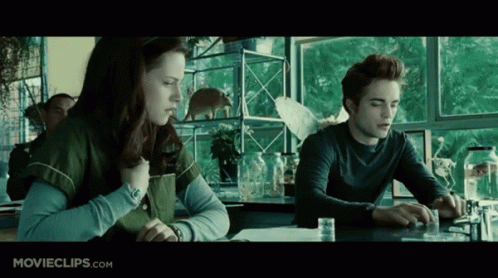the depths of deliverance
Pop music's Joan of Arc drives a stake thru the heart of religious fundamentalism. Plus, a music playlist for the religious existentialist.

David Allan Stewart, half of the British pop duo Eurythmics, once accused Lauren Mayberry of trying to be the “punk-rock Joan of Arc of pop.” It seems she took that as inspiration.
Lauren, frontwoman of CHVRCHES (pronounced “churches”), has self-martyred again and again in the artistic sense. With the help of her bandmates, composer Martin Doherty and musician/vocalist Iain Cook, she holds within her lyrics and performances an embodiment of stories and causes larger than herself—even, in the band’s latest outing, becoming the blood-washed, nigh-apocalyptic Final Girl.1
But today, I’m not talking about the tempting horror that is Screen Violence. I’m going back a few years to my favorite song by my favorite band of all time and space: “Deliverance,” the third track on 2018’s Love is Dead. Maybe it’s inaccurate to call “Deliverance” my favorite—several CHVRCHES songs compete for that honor. But “Deliverance” spoke to my soul the instant I listened to the moody vocals of the first verse drawn out over an invariable drum beat.
Careful when you’re swimming in the holy water
Drowning in your own beliefs
Careful when you’re standing at a broken altar
Asking if we feel relief
The symbolism seems all too clear. It’s a song about religion and religious people and how easy it is to be confident we’re the rescuers when we’re the ones drowning. It’s written from a wounded place (or at least capable of being read that way)—from someone who stands on the shore of the sacred ocean and watches as lifeboats sail off the edge of the world.
But as I re-listened (and re-listened), I wondered if, maybe, I was seeing meanings where there weren’t any and filtering my own experiences into the song. I was surprised no one was talking about “Deliverance.” Everyone seemed to be talking about “Graves” as a response to the apathy surrounding the Syrian refugee crisis. Or Lauren’s collaboration with The National’s Matt Berninger on “My Enemy.” And the “Miracles” music video stirred up quite a lot of chatter.
But no one was talking about “Deliverance.” I don’t know what this says about society in 2018, but I thought surely an anti-religious fundamentalism punk-pop song will get some play in this economy. But, no. So I squirreled away my thoughts (and notes2) and went on with life. Except, I return to this song again and again, even now.
The metaphors which seemed so apparent to me are, if not complicated, at least layered. Lauren told American Songwriter that “Deliverance” “is responsible for a lot of the imagery on [Love is Dead], so without that one, I don’t know if we would have gotten there.” She told another outlet that, with this song, she “was consciously trying to use imagery to further a narrative or a story, rather than trying to use it to obscure what I really mean…”
I think, rather, she accomplished both.
The imagery in “Deliverance,” at least as I see it, works both ways. It is good to swim in holy waters, but bad if you think the ocean belongs to you. That’s where the danger comes in. The minute we think we own our faith—that we understand it completely and all others are wrong—we risk going astray. The minute we think we see and know, we become blind and ignorant. As Jesus told the religious experts of his day after he had healed a man born blind (John 9:39, 41):
For judgment I came into this world, that those who do not see may see, and those who see may become blind…
If you were blind, you would have no guilt; but now that you say, ‘We see,’ your guilt remains.
If we insist that we see, we end up standing on a “broken altar,” a structure ruined by form without function and sacrifice without restoration. We end up with a religion that wounds and never heals. We become like the souls bound in Plato’s Cave, assuming the shadows are the real thing and unable to conceive of anything outside our narrow view.
Careful when you’re looking for a true confession
Mirror what you wanna see
Careful when you’re telling us about obsession
Saying that we’re never free
We demand ‘true confessions’ of others when we really just want to look at them and see a mirror of ourselves—like the religious leaders questioning the man born blind. “Give glory to God,” they said. “We know that this man [who unblinded you] is a sinner.” They wanted the receiver of sight to agree with them. They needed him to. Their entire theological scaffolding was threatened by the fact that he, with open eyes, was standing before them.

The second verse speaks personally: Lauren uses I now instead of the corporate we.
Trust me when I tell you ‘bout my own convictions
Made my mind up long ago
Trust me when I tell you it’s a contradiction
Wishing that I didn’t know
It’s easy to dismiss someone else’s conviction as insincere or false, to refuse to lend their path to certainty the credibility we desire for our own. For the man born blind, his certainty comes thru experience, not via the Law or the Prophets. When the representatives of the Law and the Prophets claim that the man who healed him on the Sabbath is a sinner, he says, “Whether he is a sinner I do not know. One thing I do know, that though I was blind, now I see.”
If we desire to build bridges with people outside our religious, political, or social comfort zones, we must take them seriously when they say they believe something. We have to take them just as seriously as we want to be taken. We even have to take them seriously when they point out our contradictions and hypocrisy. We can’t truly disagree with someone if we don’t believe they believe what they say they believe.
Trust me that I struggle with all your destruction
Screaming that I told you so
Trust me when I talk about the disillusion
Building up and letting go
The religious structure of Jesus’ world was incredibly destructive. The parents of the man born blind exhibit the fear that oppressive religion produces. They refused to support their son in his legal kerfuffle with the Jewish authorities “because they feared the Jews, for the Jews had already agreed that if anyone should confess Jesus to be Christ, he was to be put out of the synagogue.”
Religion produced estrangement, dividing families and standing as a barrier to true faith. Slavish and unwarranted religious commitment rips communities apart. I’ve seen it. I’ve experienced it in ways too painful to recount. I have stood on the shore of the sacred ocean as the ship of Zion sailed into outer darkness. I have felt the disillusion building up in me. And I have wondered, is this deliverance?

The religious authorities refused to take the man born blind seriously; if he didn’t toe the party line, they didn’t want him around. I’m sure his sass—Why do you care so much? Do you want to become his disciples too?—didn’t help either. They threw him out of the synagogue.
And then Jesus, who would never let one of the homies down—except, temporarily, when he did for three days—comes to find him.
Jesus heard that they had cast him out, and having found him he said, “Do you believe in the Son of Man?”
He answered, “And who is he, sir, that I may believe in him?”
Jesus said to him, “You have seen him, and it is he who is speaking to you.”
He said, “Lord, I believe,” and he worshiped him.
The man born blind takes Lauren’s advice:
You better hold on to what you love
You better give up on giving up
I don’t think the ex-blind man was in danger of losing faith in the one who had wrought such transformation in his life. But if Jesus hadn’t come along to affirm him, who knows what would have happened? Actually, I do know. This poor man likely would have succumbed to the rules of the religious community that he was part of and would have come to believe on some level that the act of his deliverance was itself sinful. He would have been condemned to a life of guilt and doubt.
As I said earlier, themes work both ways in this song. “Hold on to what you love” and “give up on giving up” are targeted to the preachers, prophets, and political grandstanders too. If the world is as they say it is, they’d better stick to what they believe and hope to God they’re right. No waffling now! You don’t get to be delivered. Or, do you?
Is it deliverance if you can never change?
Is it deliverance if you hurt me in exchange?
If we can’t change, can we truly be delivered? Or is deliverance found in our imperviousness to criticism, in our perseverance to the uttermost, in our sacred rightness? Can we claim to have been delivered from sin if we stab another soul on our way to Heaven?
Within oppressive religious structures, the people who are most bound claim to have the keys to the prison. The blind claim to see, the slaves claim to be free. But are we really free if we can never change? Are we really free if our freedom is a wound to others?
“Deliverance” stakes itself on these questions. Indeed, if pop’s Joan of Arc is to be believed, the entire album burns with the imperishable flames of religious existentialism. I’m here for it.

asides + signal boosts
the depths of deliverance playlist! As I was writing this, I kept thinking about how “Deliverance” intersects with other songs that I love in the religious existentialism genre.3 So instead of making this post super-long, I decided to create a playlist with all those songs. No, Hozier’s “Take Me to Church” isn’t on there, and there may be an overbalance of Switchfoot. These aren’t songs you’ll hear in church, but if you’re like me, they’ll make you stop and think and maybe worship a little. And sometimes they’ll break your heart: Saint Peter took my fake ID / Jesus walked me into Heaven / But they asked me to leave. 😭
With final exams and term papers done this semester, I’m turning my creative attention in the waning weeks of this year to the final segment of rewrites on my nonfiction book. When it’s all wrapped up, I’d love to have some beta-readers. Hit me up if you’re interested. (If you love Narnia or C.S. Lewis, you’re gonna love this book.)
This book is my story. My journey into this mystery. But it’s not just my story. It’s C.S. Lewis’ story and your story, too, I hope. Our story of burrowing deeply into the mystery and allowing ourselves to believe the little heart-whispers that tell us here is not all there is.
I’m really tired and want to go watch His Dark Materials: Season 3!!! But like a good Baptist preacher, I can’t have just two points to this section; there has to be a nice, round three points.4
So. I’m almost finished reading The Modern Myths, by Philip Ball. Something he points out is that the stories he regards as modern myths—the stories that are elastic and expansive and constantly being retold—are not actually very well-written. Not even by the standards of their day. Frankenstein and Dracula and The War Between the Worlds are, forgive the comparison, no better than Twilight, and probably worse. Make of that what you will.
The work Lauren puts into aesthetic, using her body as an extension of CHVRCHES’ symbolic appropriation is impressive and admirable. Here, she gives away the secrets for Screen Violence.
I scribbled notes about “Deliverance” in one of my notebooks back in 2018, so in reality this substack post has been in the works for over four years.
Yes, I’m making it a genre.
It’s oppressive religious structure stuck deep within me.





Hit me up as a beta reader. Caleb and Tamar might be good options